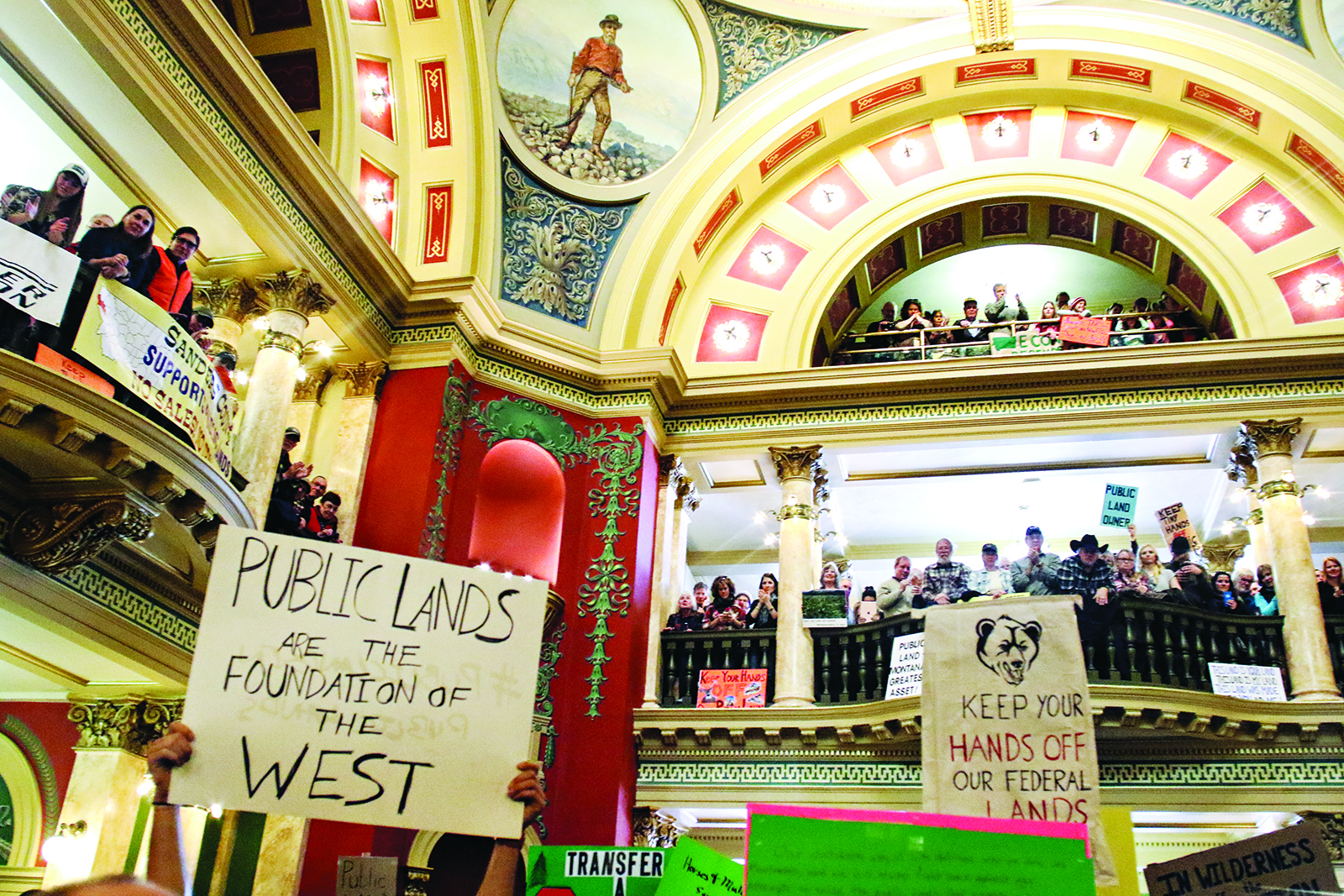Montanans Line Up Against Resolution to Back Utah’s Federal Public Lands Lawsuit
Rep. Tom Millett, R-Marion, insisted House Joint Resolution 24 is merely a statement of support “for our sister state.” But about 50 Montanans framed it a precursor to a “land grab,” and their testimony was a referendum on public lands.
By Tristan Scott
Calling it a “back-door assault” on public lands, Montanans lined up Monday night in opposition to a Marion lawmaker’s resolution to support the state of Utah in its legal quest to lay claim to 18.5 million acres of federally managed land within its borders.
Although Rep. Tom Millett, R-Marion, said House Joint Resolution 24 (HJ 24) “does nothing to our public land” in Montana and described the intent of his measure as merely “saying we support Utah in filing their lawsuit against the federal government,” about 50 people turned out in opposition to the provision at a March 24 hearing before the House Energy, Technology and Federal Relations Committee.
The lack of a single proponent of HJ 24 prompted a one-word response from Committee Chair Gary Parry, R-Colstrip — “Wow” — before he instructed the 30 opponents who turned up at the Capitol in person and the 20 individuals queued up online to “stick to the bill.”
“Let’s not pontificate on all the possibilities that could happen,” Parry said, allowing each opponent one minute of testimony.
But pontificate they did, particularly as a majority of people interpreted the resolution as a precursor to a “land grab” and a harbinger of future efforts that could lay the foundation for transferring or selling Montana’s federal parcels.
“I think this thing from Utah is just a back-door assault on federal lands,” Kenneth Lee, of Fairfield, said. “I think they want to get the ball rolling to soften up the opposition.”
At the center of HJ 24 is Utah’s faltering effort to declare it unconstitutional for the U.S. Bureau of Land Management (BLM) to manage 18.5 million acres of “unappropriated land” without a formal designation. On Aug. 20, 2024, the U.S. Supreme Court rejected Utah’s petition to the nation’s high court challenging the constitutionality of the federal government’s “indefinite retention of millions of acres within state borders.”
The state can, however, file another lawsuit with a lower district court, and Millett’s provision seeks to declare the Montana Legislature’s support for that lawsuit, should Utah proceed.
“As of today they have not filed it yet,” Millett told committee members Monday. “I have been told by people that I keep in contact with in Utah that they will file. We just don’t know when.”

Attempting to clarify “a lot of misinformation” surrounding HJ 24, Millett said Utah’s lawsuit, should it materialize, targets “unappropriated” public land. That doesn’t include Utah’s five national parks, or any of the state’s national monuments, national forests, or recreation or wilderness areas, which represent about half of the federal public land in the state.
“Unfortunately there are groups out there telling the people of our great state that HJ 24 will directly lead to all public lands in Montana — federal, state, national forests, national parks, wilderness areas — they are telling them that all will eventually be sold off and be privatized and that is simply and unequivocally not true,” Millett said. “That’s not what this does. HJ 24 is simply a statement of support to our sister state of Utah in their quest to get an answer to the 50-year-old question: Is the federal policy embodied in … the Federal Lands Policy and Management Act of 1976 of perpetual federal retention of unappropriated public lands unconstitutional. That’s it. That’s what Utah wants to know. Is it unconstitutional that they’re holding this land forever?”
But opponents characterized the resolution as a cloak-and-dagger effort to normalize the idea of privatizing and selling public lands.
Mack Long, state chairman of the Back Country Horsemen of Montana, which was established in the Flathead Valley in 1973 in response to threats to public lands, said “signing on to support Utah opens the door for our public lands in Montana to be disposed of … We ask you to vote no on HJ 24 and oppose efforts to take away our public lands.”
Assuming control over lands now controlled by federal agencies has regained leverage as a popular stance among some ultra-conservative lawmakers in recent years as flaws in federal management practices become more pronounced in the wake of devastating wildfire seasons, diminished timber harvests and economic harm. But the efforts to transfer ownership of public land in Montana and beyond have consistently failed to overcome resistance from a majority of voters across the Mountain West, who say they don’t want their public lands sold or transferred to states — a resounding message reinforced by a decade and a half of polling.
Across Montana, state and federal agencies, land managers and timber industry officials, including the Montana Wood Products Association, are unequivocal in their opposition to land transfers, due in large part because they say it is logistically and financially unfeasible.
According to Millett, however, the reclamation of federal parcels could be a windfall to the Treasure State.
“The U.S. generates significant revenue from these unappropriated lands — billions of dollars annually that will go to our counties and schools. But instead we get but a pittance, leftover crumbs for what should be our land,” he said.

Kali Wicks, of the Greater Yellowstone Coalition, pushed back on that logic, saying the federal government supports Montana’s budget to the tune of about $4.7 billion, and that the state is ill-equipped to manage Montana’s 8 million acres of “unappropriated” land.
“If we were to follow Utah down this road and we were to somehow take control of our federal lands, we don’t actually have the revenue or the resources to support them, which would lead to them being sold to the highest bidder,” she said.
Nick Gevock, the Sierra Club’s campaign organizer for wildland and wildlife in the northern Rockies, said the group’s legal analysts “found that this is a really harebrained legal theory that has no real merit and this resolution is so full of factual errors that I can’t go through them one by one.”
“But what we will says is the U.S. Constitution grants Congress the sole authority to manage and determine the disposition of these public lands … Nobody wants this as evidence by the fact that there are no proponents here today. This is a sell-off.”

Kearstyn Cook, of the Montana Conservation Voters, said the unappropriated lands at the center of Utah’s lawsuit are public lands that are leased for grazing, recreation and mineral extraction.”
“People rely on them and because of the cost associated with managing public lands turning any of them over to the states is a dangerous step toward privatizing them,” she said. “This is a slippery slope and even just a resolution supporting this idea is unnecessary, reckless and disregards Montanans who value our public lands.”
Noah Marion, political and state policy director for Wild Montana, said HJ 24 is “a dangerous step toward selling the fiction that Montanans support transfer.”
“We do not; Montanans have overwhelmingly rejected transfer over and over,” he said. “Despite that clear mandate, some lawmakers remain committed to advancing extreme special-interest agendas.”
Two separate measures introduced in Montana this legislative session call for selling state lands to private interests. House Bill 379, which failed on third reading Monday in a 42-55 on the House floor, proposes significant revisions to the laws governing the leasing and sale of state land for commercial purposes, while Senate Bill 381, which missed the deadline for transmittal, proposed selling off as much as 126,000 acres of state public lands for “homesteading” for residents who have lived in Montana for more than a decade.